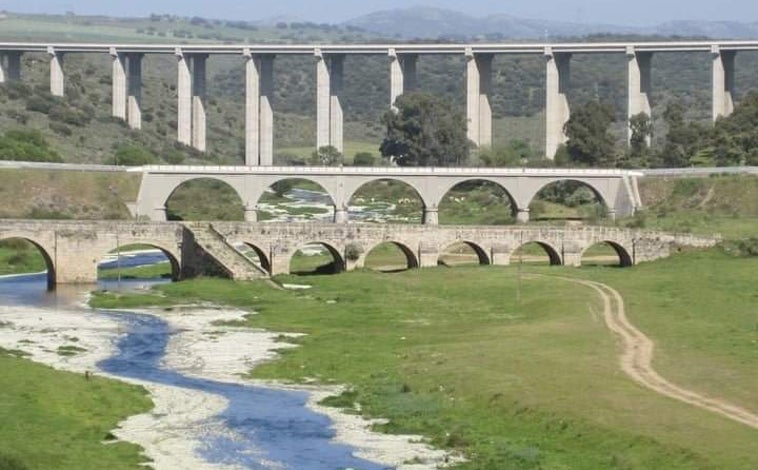Miño, Ebro, Duero, Tagus, Guadiana, Júcar, Segura and Guadalquivir. A refrain that most Spanish students have repeated in school classrooms and have written dozens of times in exams. To these must be added the tributaries such as the Sil, the Pisuerga, the Jarama, the Genil or the Segre and thus a list of names that “make more than 35,000”, answers Ramón J. Soria, anthropologist and author of the book ‘Spain does not it is country for rivers’. Soria, from Extremadura by birth, in his last essay he travels through the Spanish hydrography through 40 rivers, although if he has to choose one, the chosen one would be the Tagus. “It represents the biggest problems of Iberian torrents,” he explains. Pollution, overexploitation and barriers that can be observed in most rivers throughout the Iberian Peninsula. In April 2022, the University of York, in the United Kingdom, analyzed the water of 258 rivers around the world where one of the three most polluted had a Spanish name: the Manzanares. “We have to behave like citizens again and clean and take care of them to prevent climate change from turning half of Spain into a desert,” replies the anthropologist.
-You title your book ‘Spain is not a country for rivers’, why?
– Because in the last 50 years we have been mistreating them. Spain is thought to be dry, arid, where there is little water, and there may be little water, but it is one of the countries in Europe that has the most rivers. Sometimes people don’t know the number of rivers we have and there are more than 35,000. There are small, large, medium or temporary rivers that dry up and only carry water in spring. But we have rivers that have been very alive, full of life and with very diverse uses until very recently. 50 or 60 years ago, we had a very intense love relationship with them, now we have completely forgotten them and we see them as an irrigation channel to irrigate the Murcian or Alicante orchard, or as a sewer because through them we release all the water waste we produce, whether industrial or mining. Nobody thinks of a river as an ecosystem where there are fish, frogs and insects… or a place where we used to live together and there was a certain respect, not like now that we dirty and shit them.
-Have you found the answer to that step from love to oblivion?
-I was surprised that there is a forgetfulness on the part of journalists, intellectuals and writers that does not occur in other countries. In the 20th century, rivers were protagonists in their stories, even, many times they were the main protagonists in their stories or their essays or poems, and not in Spain. Here the rivers were treated with the topical metaphor that “our life is the rivers that go to the sea to die” or as a beautiful landscape to walk. Beyond that, we have totally forgotten them. Spain is a very mountainous country where it is not easy to walk along many rivers and until recently we were fascinated by civilization, by the city or by modernity and, on the other hand, rivers were synonymous with rural Spain and the primitive. I think that’s one of the reasons. Before, the river defined you from a place, now nobody is called a riverside anymore, because it looks outdated, obsolete, and even redneck.
“If we continue to manage water as a simple water resource for irrigation, we are going to have a very bad time”
– Do we have a pending issue that is to save the rivers?
-The subject would be to get them out of oblivion, for people to recover them, remember them and visit them. Before, it seemed horrifying to me that they went to rivers that are intact, but now I prefer that they see them and get to know them, because that is the only way they don’t destroy them because they know their value. The thirst for water is insatiable and more and more dams are planned to take it and to irrigate more hectares. I would like the rivers to appear more in the newspapers and not only to mention the problems of the Tagus between those of Guadalajara and Murcia; the Tagus is a beautiful river full of life. They have to be wild and clean, because otherwise we are going to die of thirst and the European Union says this and it will happen in 30, 40 or 50 years and that is in no time. 40% of the rivers in Spain will be dry and there will be 30% less rain, therefore we will have less water and 60% of the farmland in Spain will have an economic value of zero Because it’s going to be practically a desert. From a selfish point of view, we have to save the rivers to save ourselves.
Ramon J. Soria

-And are rivers taught well in Spain? I mean in terms of education…
-The contents are not bad, because the water cycle is taught, the formation of the environment, its proximity… but they are not visited. The students from my region study the rivers, but they don’t visit them and so you can’t see the seriousness of what is happening and, furthermore, going is valuable to understand how important they were in the 19th century. This is what I was saying before, if we continue to manage water as a simple water resource for irrigation, we are going to have a very bad time, even in the best of cases. In fact, we are already having a hard time and there are tensions with farmers. Nor is the climatic benefits of rivers explained very well. Spain is a country with a very strange orography with a lot of valleys and many mountains, the rivers flow along the surface and also fill the aquifers that generate small microclimates that can make it milder where there is a heat wave; but if we dry them we will scorch at 50º. Many areas of Spain are going to become what we see in North Africa. In Libya there are a lot of rivers, but they are dry, they are fossil rivers where only the bed remains. In those places 3,000 years ago there was water, fish, hippos and people on its banks and due to a change in the climate it stopped raining and there is no water anymore. It is possible that in Spain, in an important part of the country, that will happen shortly and when I say soon it is 30 or 50 years and that is going to be a problem.
-Is this forgetfulness an Iberian issue or generalized in Europe?
-In Spain, with few exceptions, it was built far from the rivers because they were very tumultuous and if they came flooding they flooded the neighborhoods. In the 50s it was forgotten and cities began to grow wildly and eat up the land of the rivers. Then the floods and floods arrived, but to avoid them they were channeled and that was not the case in Europe due to many factors. In some cases, because they are not as tumultuous as the Spanish and in others because there was a culture of defending and protecting them. Lately, it is true, there have been several attempts to recover that part of the rivers, for example, in Soria, Burgos or Madrid. They are trying to recover those banks so that it is not so dirty and that the river flows well, but in Madrid, although the renaturation project is going well, we have eaten the banks of the Manzanares and it is impossible to recover them because half of Madrid would have to be demolished.
-If you had to define Spain as a river, what would it be?
-All. In my book I have taken 40 rivers to talk about the problems that the 35,000 have and I have taken small, large, tributaries, some that have disappeared but not because they have dried up, we have even buried them. I think that everyone has their river, that of their childhood, that of their parents or their grandparents…

“It makes no sense that we use water as if there were no tomorrow, because there will be tomorrow”
-And what would be yours?
-I am from Extremadura and I lived there until I was 20 years old, then I went to Madrid and I am from Madrid. My river would be the Tagus, because it is a thousand-odd kilometers long and one of the longest in Spain. It is one of the most interesting in the Iberian Peninsula, because if you go to the Alto Tajo it seems that you are in Sweden with a river of blue, cold water with amazing waterfalls and people do not know it. Then you descend, you see its middle and lower part with all the most terrible problems that a river can have today. Here you come across hydroelectric power plants, with the famous Tagus-Segura transfer that swallows more than half of the Tagus and leaves it without water… And, now, the problem of water distribution is added, because the Framework Law on Water requires that an exact number of cubic meters of water be given to the river. Everyone has thrown their hands up, especially farmers saying that water cannot be taken from their orchards to the river. This idea seems exotic to people, because we think that the river’s water is ours, but if we take it all away, the Tagus dies. To this we must add that it is one of the most polluted, it is a river that makes you want to cry. We tend to think that a river that passes through my land belongs to me and it is not like that, it belongs to all Spaniards and, of course, it does not belong to irrigators or farmers; it belongs to everyone In addition, in the case of the Tagus, it is also the Portuguese who have the right to this water.
-Is there any message of optimism?
-Yeah. We are still waiting for the second agricultural revolution and that it is not to use different irrigation systems, but, perhaps, to grow different things. In a globalized world it doesn’t make sense that we suck half Guadalquivir for avocados, maybe we have to use another crop. Nor does it make sense that we are irrigating olive trees, when we have been cultivating olive trees in dry land for 10,000 years, and it does not make sense that we are irrigating dry crops either. A few weeks ago I went out with my bicycle through Cuenca and saw how they were irrigating cereal with sprinklers sucking a small river that was next to it. It makes no sense that we use water as if there were no tomorrow, because there will be tomorrow. But I am optimistic, because there is a change of sensitivity in young people and if we make rational use of water and use the rivers again as citizens; Spain will suffer from climate change, but half of it will not become a desert and the value of farmland will not be zero.
www.hoy.es
Eddie is an Australian news reporter with over 9 years in the industry and has published on Forbes and tech crunch.